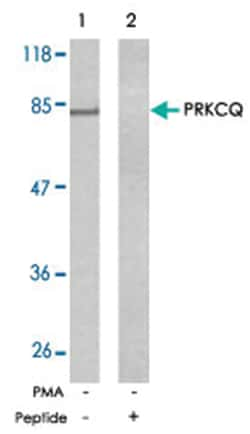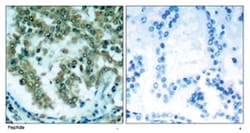Learn More
PRKCQ Rabbit anti-Human, Mouse, Rat, Polyclonal Antibody, Abnova™
Rabbit polyclonal antibody raised against synthetic peptide of PRKCQ.
Supplier: Abnova Corporation PAB26806
Description
Protein kinase C (PKC) is a family of serine- and threonine-specific protein kinases that can be activated by calcium and the second messenger diacylglycerol. PKC family members phosphorylate a wide variety of protein targets and are known to be involved in diverse cellular signaling pathways. PKC family members also serve as major receptors for phorbol esters, a class of tumor promoters. Each member of the PKC family has a specific expression profile and is believed to play a distinct role. The protein encoded by this gene is one of the PKC family members. It is a calcium-independent and phospholipid-dependent protein kinase. This kinase is important for T-cell activation. It is required for the activation of the transcription factors NF-kappaB and AP-1, and may link the T cell receptor (TCR) signaling complex to the activation of the transcription factors. [provided by RefSeq
Sequence: R-L-Sp-F-ASpecifications
| PRKCQ | |
| Polyclonal | |
| Unconjugated | |
| Western Blot (1:500-1:1000) Immunohistochemistry (1:50-1:100) The optimal working dilution should be determined by the end user. | |
| PRKCQ | |
| PRKCQ | |
| A synthetic peptide corresponding to residues surrounding S676 of human PRKCQ. | |
| 100 μg | |
| Primary | |
| Human, Mouse, Rat | |
| Liquid |
| Immunohistochemistry (PFA fixed), Western Blot | |
| 1 mg/mL | |
| Rabbit polyclonal antibody raised against synthetic peptide of PRKCQ. | |
| In PBS, 150mM NaCl, pH 7.4 (50% glycerol, 0.02% sodium azide) | |
| MGC126514/MGC141919/PRKCT/nPKC-theta | |
| Rabbit | |
| Affinity chromatography | |
| RUO | |
| 5588 | |
| Store at -20°C. Aliquot to avoid repeated freezing and thawing. |
Your input is important to us. Please complete this form to provide feedback related to the content on this product.
For Research Use Only

